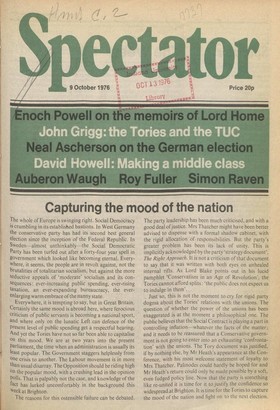Capturing the mood of the nation
The whole of Europe is swinging right. Social Democracy IS crumbling in its established bastions. In West Germany the conservative party has had its second best general election since the inception of the Federal Republic. In Sweden—almost unthinkably—the Social Democratic Party has been turfed out after a forty-four year spell in government which looked like becoming eternal. Everywhere, it seems, the people are in revolt against, not the brutalities of totalitarian socialism, but against the more seductive appeals of 'moderate' socialism and its consequences: ever-increasing public spending, ever-rising taxation, an ever-expanding bureaucracy, the everenlarging warm embrace of the nanny state.
Everywhere, it is tempting to say, but in Great Britain. Certainly the same mood is abroad here, where ferocious criticism of public servants is becoming a national sport, and where only on the lunatic Left can defence of the Present level of public spending get a respectful hearing. And yet the Tories have not so far been able to capitalise on this mood. We are at two years into the present Parliament, the time when an administration is usually its least popular. The Government staggers helplessly from one crisis to another. The Labour movement is in more than usual disarray. The Opposition should be riding high on the popular mood, with a crushing lead in the opinion Polls. That is palpably not the case, and knowledge of the fact has lurked uncomfortably in the background this Week at Brighton. The reasons for this ostensible failure can be debated.
The party leadership has been much criticised, and with a good deal of justice. Mrs Thatcher might have been better advised to dispense with a formal shadow cabinet, with the rigid allocation of. responsibilities. But the party's greater problem has been its lack of unity. This is implicitly acknowledged by the party 'strategy document', The Right Approach. It is not a criticism of that document to say that it was written with both eyes on unhealed internal rifts. As Lord Blake points out in his lucid pamphlet 'Conservatism in an Age of Revolution', the Tories cannot afford splits: 'the public does not expect us to indulge in them'.
Just so, this is not the moment to cry for rigid party dogma about the Tories' relations with the unions. The question of whether the power of the unions has been exaggerated is at the moment a philosophical one. The public believes that the Social Contract is playing a part in controlling inflation—whatever the facts of the matter; and it needs to be reassured that a Conservative government is not going to enter into an exhausting 'confrontation' with the unions. The Tory document was justified, if by nothing else, by Mr Heath's appearance at the Conference, with his most welcome statement of loyalty to Mrs Thatcher. Palinodes could hardly be hoped for and Mr Heath's return could only be made possible by a soft, even fudged policy line. Now that the party is something like re-united it is time for it to justify the confidence so widespread at Brighton. It is time for the Tories to capture the mood of the nation and fight on to the next election.


































